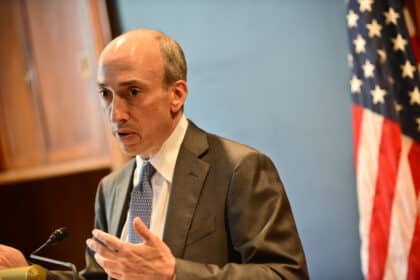Recent reports also suggest that the operations of Binance.com and Binance.US are intertwined. This would mean that regulators might exert greater scrutiny in this case.
On Sunday, March 5, Wall Street Journal published a report sharing some exclusive details regarding Binance‘s operations and its involvement with regulators. In its report, WSJ mentions that crypto giant Binance wanted to hire Gary Gensler as an adviser, years before he became the chief of the US Securities and Exchange Commission (SEC).
The publication reported that Binance was making active efforts to bring Gary Gensler on board in the period between 2018-2019. It was when the SEC chief was previously working as a professor at the Massachusetts Institute of Technology.
These efforts involved former Binance venture arm head Ella Zhang, and Harry Zhou, setting up a meeting with Gensler back in 2018. As per WSJ, Zhou was working with a company financed by Binance at that time.
In its report, WSJ stated that it has got access to certain chats, texts, and documents “I observe that while Gensler declined advisor-ship, he was generous in sharing license strategies,” Zhou wrote in a chat message back then, reported Journal.
However, Binance working with former US officials is nothing new. Previously, Binance tapped other US government officials such as former Senator Max Baucus of Montana, as advisers.
Coming to Gary Gensler, a Binance employee stated that they were confident about Gensler coming back to the seat if Demas won the 2020 election. Reportedly, another meeting took place in March 2019, between Binance founder Changpeng Zhao and Gary Gensler.
The publication also notes that several private companies tried to approach Gensler while he was at MIT. However, Gensler declined all the offers.
Relationship Between Binance.com and Binance.US
Furthermore, the WSJ report also highlights the relationship between Binance and its American arm Binance.US. The report adds that fearing regulatory scrutiny, the exchange’s heads took measures t mitigate risks and shield Binance from regulatory oversight.
Back then in 2018-2019, Binance operated its hubs majorly from China and Japan. Yes, a fifth of its customers were from the United States. During that time, the US regulators had already signaled an impending crackdown on unregulated offshore crypto players.
In a private chat in 2019, a Binance executive warned colleagues that there could likely be a “nuclear fallout” for Binance’s executives and its businesses. As per the messages and documents accessed by WSJ, Binance set out a plan to neutralize US authorities, fearing prosecution.
WSJ noted that although Binance and Binance.US portray as separate entities, they are quite intertwined such as mixing staff and finances, sharing affiliate entity that bought and sole cryptocurrencies, and much more.
Now, if the US regulators can find a link between the two entities, they would execute larger policing power on Binance’s entire business. Recently, Binance failed to secure a license in Texas, as regulators didn’t financial information requested from chairman Changpeng Zhao.
next